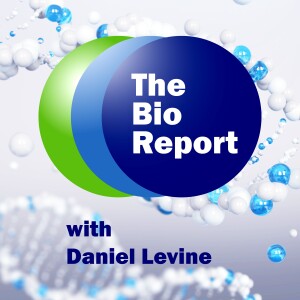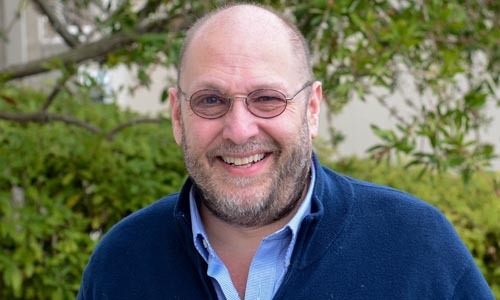
The Bio Report podcast, hosted by award-winning journalist Daniel Levine, focuses on the intersection of biotechnology with business, science, and policy.
The Bio Report podcast, hosted by award-winning journalist Daniel Levine, focuses on the intersection of biotechnology with business, science, and policy.
Episodes

Wednesday Oct 29, 2025
Hitting the Reset Button on Cellular Aging
Wednesday Oct 29, 2025
Wednesday Oct 29, 2025
Transcription factors control the genetic programs that maintain cellular balance, but while they have been seen as compelling targets for aging-related disease, they have long been considered “undruggable.” Junevity’s RESET platform leverages large-scale human omics data and AI models to pinpoint key transcriptional drivers of disease and to design siRNA therapies that restore healthy gene expression. We spoke to John Hoekman, co-founder and CEO of Junevity, about the role of transcription factors in healthy biology and aging-related disease, the company’s AI-driven platform for identifying dysregulated transcription factors, and its lead programs targeting type 2 diabetes and obesity.

Wednesday Oct 22, 2025
Changing the Ovarian Cancer Treatment Landscape with a DNA-Mediated Immunotherapy
Wednesday Oct 22, 2025
Wednesday Oct 22, 2025
Ovarian cancer remains one of the deadliest cancers affecting women, and it is expected to claim nearly 13,000 lives in the United States in 2025. Despite progress in survival rates, nearly 80 percent of patients are still diagnosed at advanced stages, when the disease has already spread and is difficult to treat. Imunon’s experimental DNA-mediated immunotherapy is designed to deliver interleukin-12 directly into the tumor. A phase 2 study demonstrated that the experimental therapy, when combined with the standard of care, provided a 13-month survival benefit compared to women receiving only the standard of care. We spoke to Stacy Lindborg, CEO of Imunon, about the company’s DNA-mediated immunotherapy, how it avoids the systemic toxicities that undermined earlier IL-12 approaches, and how it could change the treatment landscape for the disease.

Wednesday Oct 15, 2025
Why the United States Must Fall in Love with Biotechnology, or Take a Back Seat to China
Wednesday Oct 15, 2025
Wednesday Oct 15, 2025
China’s emergence as a biotech superpower may have appeared to happen suddenly, but it reflected a long-term vision and policies over many years that enabled its success. As biotechnology transforms not only medicine but also industries such as food, fuel, and materials, the competition between China and the United States to shape the future bioeconomy is intensifying. We spoke to Drew Endy, associate professor of bioengineering and senior fellow of the Hoover Institution at Stanford University, about China’s all-of-nation strategy, how the United States has misallocated research dollars, and why a cultural embrace of biotechnology will be critical for the success of either country.

Wednesday Oct 08, 2025
Transforming Drug Discovery and Disease Research—One Cell at a Time
Wednesday Oct 08, 2025
Wednesday Oct 08, 2025
The ARC Virtual Cell Atlas uses high-throughput single-cell genomics, artificial intelligence, and open science to understand the complexities of cellular behavior. Developed through a partnership between the ARC Institute, 10x Genomics, and Ultima Genomics, the public domain resource integrates data from hundreds of millions of cells. By curating and harmonizing vast amounts of single-cell measurements, the Atlas paves the way for virtual cell simulations that can predict how cells respond to genetic or chemical changes. These models hold the promise for transforming drug discovery by accelerating target identification, optimizing candidate compounds, and reducing the cost of drug development. We spoke to Arc Institute’s Core Investigator Hani Goodarzi, Ultima Genomics CEO Gilad Almogy, and 10X Genomics CEO Serge Saxonov, about how the Atlas will serve academic and industry researchers developing therapies, how it will help unravel disease mechanisms at a cellular level, and provide broad access to advanced cellular analytics.

Wednesday Oct 01, 2025
Scratching the Surface with a Novel Approach to Treating an Orphan Lung Disease
Wednesday Oct 01, 2025
Wednesday Oct 01, 2025
Bronchopulmonary dysplasia is a condition that affects preterm infants, especially those born with underdeveloped lungs who require prolonged oxygen therapy or mechanical ventilation to help them breathe after birth. It is characterized by damage and abnormal development of the lung tissue and airways, often resulting from life-saving interventions necessary for babies born very prematurely. Airway Therapeutics is developing a new class of biologics for respiratory and inflammatory diseases, starting with bronchopulmonary dysplasia. We spoke to Marc Salzberg, CEO of Airway Therapeutics, about the company’s experimental therapy zelpultide alfa, why it’s a pipeline-in-a-product, and its development path forward.

Wednesday Sep 24, 2025
A Dual Action Approach to Treating MASH
Wednesday Sep 24, 2025
Wednesday Sep 24, 2025
MASH, a chronic and progressive form of fatty liver disease that until recently was known as NASH, affects millions of people in the United States, and its incidence continues to rise. In fact, MASH is now among the leading causes of liver transplantation in the United States. 89bio is developing an experimental therapy to target multiple disease mechanisms of the condition. We spoke to Rohan Palekar, CEO of 89bio, about what’s driving the prevalence of MASH, the limits of existing medicines, and how its experimental therapy targets both liver fibrosis and the underlying metabolic dysfunctions of the disease. Since recording this interview, Roche announced it would acquire 89bio for $14.50 a share and a contingent value right of $6 per share for up to a total of $3.5 billion.

Wednesday Sep 17, 2025
Extending the Life of Transplanted Kidneys
Wednesday Sep 17, 2025
Wednesday Sep 17, 2025
The average kidney transplant recipient experiences kidney failure within 10 to 12 years after a transplant, putting them on a cycle that ends with kidney failure and a need for a new transplant. This cycle adds to strains on transplant recipients, payers, providers, and the healthcare system and taxes the limited supply of organs for transplantation. Eledon Pharmaceuticals is seeking to extend the functional life of transplanted organs while reducing the side effects of current immunosuppressive treatments with its experimental, first-in-class immunosuppressive therapy, Tegoprubart. We spoke to Steve Perrin, president and chief scientific officer of Eledon Pharmaceuticals, about the need for innovative approaches to immunosuppression in organ transplantation, how its experimental therapy works, and why it may also have benefits in autoimmune and neurodegenerative diseases as well.

Wednesday Sep 10, 2025
Overcoming Antimicrobial Resistance
Wednesday Sep 10, 2025
Wednesday Sep 10, 2025
Antimicrobial resistance is projected to kill up to 10 million people a year by 2050. One particular area of concern is drug-resistant gonorrhea, where existing therapies are being exhausted. Taxis Pharmaceuticals is developing therapies to combat evolving superbugs by targeting their cellular infrastructure and disrupting the mechanisms that fuel antimicrobial resistance. We spoke to Greg Mario, president and CEO of Taxis, about the public health threat posed by drug-resistant gonorrhea, the approaches it’s taking to develop new antimicrobial treatments, and the need for new funding models to bring new therapies to market.

Daniel Levine
Daniel Levine is an award-winning business journalist who has reported on the life sciences, economic development, and business policy issues throughout his career. He is founder and principal of Levine Media Group, host of The Bio Report and RARECast podcasts, a senior fellow at the Center for Medicine in the Public Interest, and author of Global Genes’ annual NEXT report on emerging trends in the world of rare disease. From 2011 to 2014, he served as the lead editor and writer of Burrill & Company’s acclaimed annual book on the biotech industry. His work has appeared in numerous national publications including The New York Times, The Industry Standard, and TheStreet.com.
